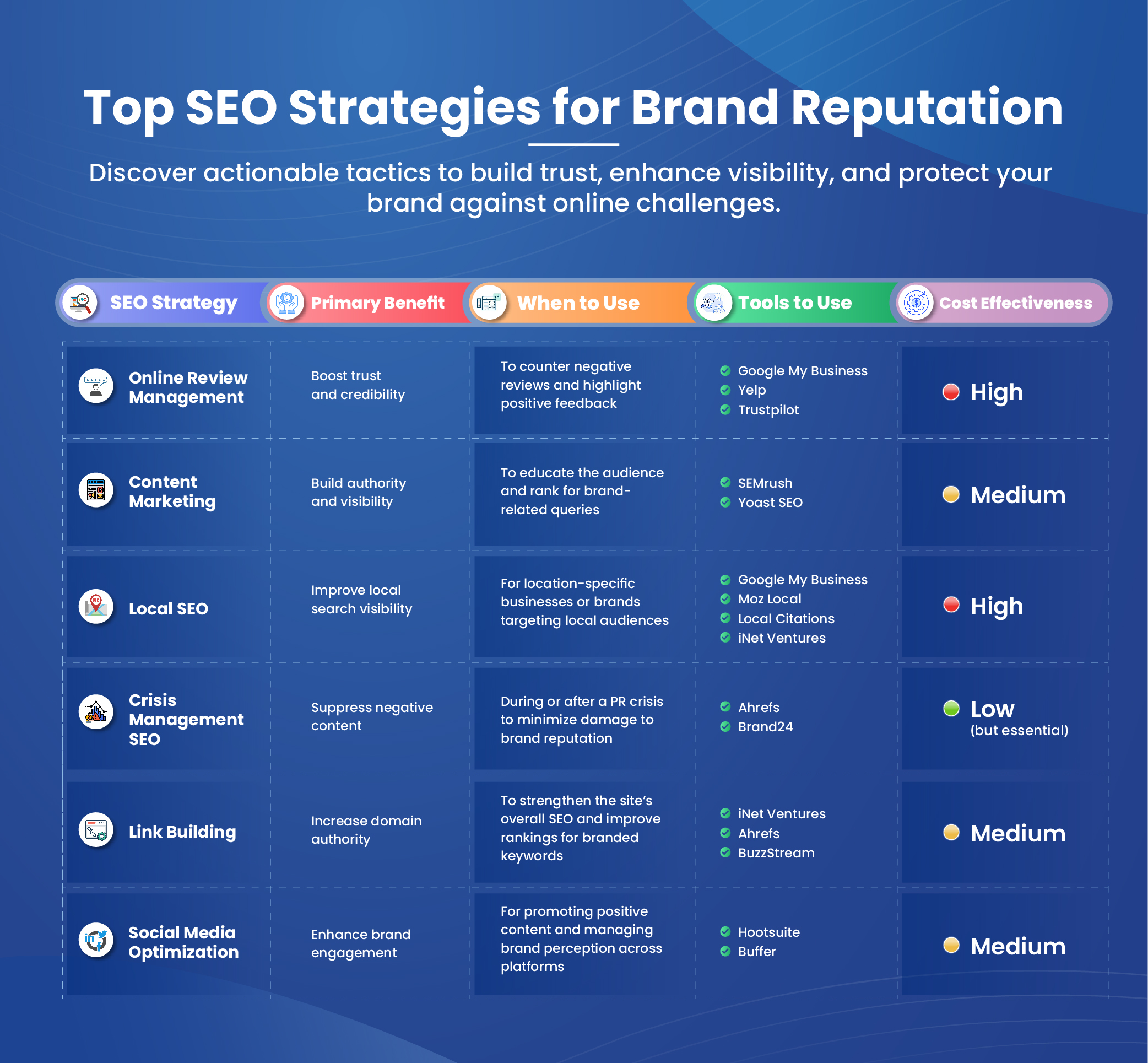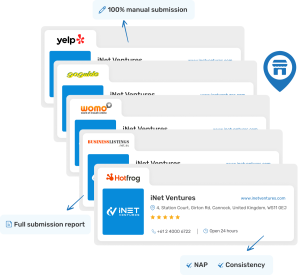In this increasingly competitive world, your brand’s reputation is everything. Whether or not your brand has a positive reputation could be the difference between success and failure.
It should be obvious, then, that brand reputation management should be at the top of your agenda. There are many tools at your disposal to help you with managing your brand’s reputation, and SEO is a particularly powerful element of that arsenal.
You may be wondering how SEO can help with brand management; after all, isn’t SEO just about increasing visibility and driving sales? Not so! Here’s our guide to using SEO to protect your brand’s reputation online.
How do brand reputation and SEO work?
In essence, you can use SEO to ensure that when people search for your brand or business online, they find the things that you want them to find.
This can be particularly helpful if you’ve received some negative press attention and you want to change the narrative, especially if you don’t feel that press attention is justified.
SEO is a big part of controlling your brand’s narrative and image online. Think about it; SEO governs everything customers will see when they search for you, so brand reputation is naturally a part of that.
By shaping your SEO strategy appropriately, you can ensure that customers find the pages and reviews you’d like them to find rather than inconvenient negative press or reviews that could harm your business.
What can SEO do for brand management?
There are a number of ways in which SEO can help you with brand management. Let’s take a look at some of them.

1. Offset Negative Reviews
Pretty much every brand will encounter a negative review at some point in its life.
- While you should never discount a negative review – especially if the things it’s saying are true – you can use SEO to help you recover from negative reviews, placing you in the ideal position to get customers rolling in again.
- This is where our digital PR services come in. We can help you build and distribute great press releases to show the world what you have in store, helping you to overcome any negative press you might have received.
- We can also build quote-style links for you on big websites, giving you organic traffic that can help to recover your numbers if you’re finding that fewer clicks are coming your way.
2. Build Local Confidence
For many brands – especially smaller businesses and sole traders – local reputation is everything.
- If something happens that damages or dents your business’ local reputation, then recovering from that damage is essential for maintaining a positive image online.
- We can help you to build local discoverability through our citation building service, through which we manually submit your information to high-quality directories, ensuring you’re able to be found when it counts.
- When your brand serves the local community, visibility in your area is crucial, so make sure you’re not neglecting this important element of brand management and SEO.
3. Creating Quality Content
In the end, your brand or business’ content will speak for itself. If your business is creating consistent high-quality content, then that will go a long way towards raising your reputation.
- That’s another area in which we can help. We offer an engaging, high-quality written content service designed to work for you and drive real, actionable results.
- Let’s say there’s a negative rumour floating around about your brand. Writing content about that rumour can help you set the record straight, and it also gives your brand the impression of being proactive and positive.
- You can also ensure that you’re featuring on Google when it comes to the keywords around that query, which is hugely beneficial for heading off negative press.
4. Focus on the Facts
No brand or business is perfect, so it stands to reason that you will inevitably make a mistake during your time as an entrepreneur or marketer.
Create stories that revolve around the positive things you and your brand are doing in the world. Focus on areas like environmentalism, charitable outreach, or employee rights.
When (and it probably is when, not if) that happens, it’s important to get ahead of the story and try to counteract it with your own.
Press Releases
Reach a national audience with our professional press release distribution service. Perfect to mix with local citations!
What SEO in brand management isn’t
Although SEO is an incredibly powerful tool in brand management, there are some things it won’t be able to do for you. In these areas, you’ll need to make improvements that will go hand-in-hand with your new SEO strategy.
Here are one or two of the things that SEO won’t fix by itself.
- Poor products or services. If your brand needs to improve its products or services, then SEO won’t be able to help you do that. SEO is all about brand reputation, not bottom-line quality, and hiding poor-quality products or services behind a flashy SEO strategy won’t help you in the long run.
- Dubious practices. It’s important to make sure that your business or brand is running everything above-board. If you’re not, then the amount of negative press you’re buried beneath will be beyond the wit of any SEO strategy, no matter how supposedly foolproof. Make sure you’re legit!
- Poor employee treatment. It’s both unethical and unwise to try and hide poor employee treatment behind good SEO, and if the truth is discovered (as it likely will be), then you’ll look even worse on the other side. Address things like poor employee treatment, dubious business practices, and poor products at the root rather than trying to hide them with good SEO.

Why reputation management is crucial for a business
It is often said that reputation takes years to forge and yet can be destroyed in an instant. Building trust and a strong reputation is vital for companies no matter the size, however, at some point nearly all businesses will face challenges – it is how these headwinds are navigated that is key to success.
When an incident happens there are many steps that can be taken to prevent it turning into a crisis. And, whilst prevention is always better than cure, once an issue arises it is better to acknowledge this and manage it rather than hoping it will blow over. Here we outline five top tips to manage a developing situation; however, if you don’t know where to begin contact iNet Ventures for crisis prevention and incident handling – we have an expert team who can help you turn the situation around.
Local SEO is essential for connecting with customers in your area. Our team of experts will build citations that boost your local visibility and help your business stand out.
Crisis handling top five rules
- Take control of the narrative – if you don’t speak then someone else will step in and fill the void, it could be a journalist, an ‘industry expert’, a pressure group or even a customer. Face up to an issue and put out a clear and factual statement so you can tell your own story. Send this statement out as widely as possible so people have access to the real facts.
- Work in tandem with emergency services When emergency services are involved, they must always take the lead in communicating information. Work with the emergency services and understand what information is theirs to share and yours to share. Depending on the situation, there will be investigations, audits and sometimes prosecutions, never overstep the boundaries with key agencies. Have a positive working relationship and take their lead in a full on emergency situation.
- If something has gone wrong then apologise – apologising is not the same as admitting fault, in some cases a business may be at fault; however, if something has gone wrong then show that you are sorry for the impact the situation has had, don’t try and shift the blame – always act with humility.
- Tell people what you are going to do to put things right – is there an emergency plan in place, do you have any mitigation actions that will help people? If an electricity supply is cut off, will you be making heaters available to vulnerable groups or providing emergency batteries to people who need to cool their medicines in a fridge? People respond well to direct and clear instructions in an emergency given by an authoritative figure. A clear plan, even in a difficult situation gives confidence and prevents things getting worse.
- Don’t make things worse – whilst the end game in a crisis situation may be to come out of the situation unscathed reputationally, it is essential not to make things worse. Very many companies get this part of crisis management wrong, they speculate on causes, blame others, hide facts or don’t engage with the media. The first hours of a crisis set the tone for what can often be weeks or months of careful management. Gather your crisis team as soon as possible, gather facts, give thoughtful and clear statements without infringing on the territory of other agencies – such as rescue services.
A classic example for students of reputation is BP’s former chief executive Tony Hayward who assured reporters that ‘he could sleep at night’ following the Deepwater Horizon explosion and most notably that he ‘wanted his life back’ after having to deal with the crisis. His PR gaffes continue to haunt BP many years later.
In the crisis world the saying is not ‘if a crisis happens but when.’ Many incidents will be avoided or better managed with a crisis communications strategy and an established team. If you have no plan now is the time to start. Building a crisis response team and creating a strategy that suits your business can feel daunting. INet Ventures offers tailored reputation and crisis consultancy services combining expertise with a digital edge so that coverage can be guaranteed.
Conclusion
We’ve outlined above just a few of the ways in which SEO can help you with brand management (and a few of the ways in which it can’t!).
Whether you are looking to build your reputation over time, or need to deal with a critical incident, we can provide a bespoke plan tailored to your needs. iNet provides both ongoing support and one-off interventions utilising our digital expertise to guarantee coverage. For more information please get in touch for a free consultation on how we can help your business.
Gilly is a content production leader with expertise in digital marketing, finance, and SEO. She has contributed to The Motley Fool and various government and internal organizations, showcasing her ability in these areas for a broad audience. Her passion for the field is evident in her engaging and informative work.




